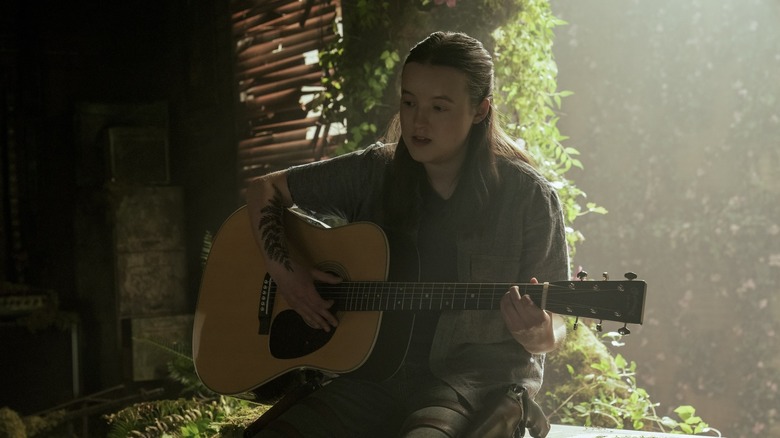Music plays a pivotal role in both the “Last of Us” video games and the HBO series adaptation. Both mediums feature a distinct acoustic guitar-driven soundtrack that complements the story’s unique neo-zombie-Western atmosphere. Beyond the original score, “The Last of Us” makes significant use of diegetic music. Joel (Pedro Pascal) showcases his guitar skills and confides in Ellie (Bella Ramsey) during season 1, expressing a wish that he could have been a singer. As the series progresses into season 2, Ellie has begun to play guitar herself, learning from Joel over the years. However, tensions in their relationship lead her to distance herself from the instrument.
Important Musical Moments
The show features memorable musical highlights, including Linda Ronstadt’s “Long Long Time,” which serves as both a title and a thematic anchor during the episode featuring Bill (Nick Offerman) and Frank (Murray Bartlett) in season 1. As season 2 unfolds, Ellie has a few poignant guitar moments. In episode 4, she performs an acoustic rendition of A-ha’s “Take On Me” for Dina (Isabela Merced). In episode 5, she picks up another guitar in an old theater in Seattle, but is soon overcome with emotion and puts it back down. What she begins to sing—a few hard-to-hear lines—is Pearl Jam’s “Future Days,” a song rich in significance for both the video game series and the HBO adaptation.
Significance of “Future Days”
The opening line of “Future Days,” “If I ever were to lose you, I’d surely lose myself,” resonates deeply with Ellie as she grapples with the grief of Joel’s death and their unresolved issues. Although the show doesn’t explicitly confirm her feelings, they are well-established in the games, leading viewers to believe that the song serves a similar purpose in this adaptation. Interestingly, “Future Days” also shares its name with the first episode of “The Last of Us” season 2, highlighting its importance from the outset. Additionally, Pearl Jam’s Seattle roots add context to its narrative placement.
This song’s significance dates back to a live event held by game developer Naughty Dog and Sony a year after the first game’s release. At this event, key scenes from the game were performed live, underscored by a real orchestra, culminating in a bonus scene featuring “Future Days,” marking a farewell for Ellie and Joel. In “The Last of Us Part II,” this song’s emotional weight becomes even more pronounced, illustrating the devastating moments Joel and Ellie do not get to share. The lyrics, “Back when I was feeling broken, I focused on a prayer,” sung by Eddie Vedder, capture the essence of Joel’s character and why Ellie becomes fixated on avenging his death.
Anachronism in the Adaptation
While “Future Days” beautifully anchors the narrative, its inclusion in the video games was somewhat out of sync with the timeline, and this inconsistency is magnified in the HBO series. The song is the final track on Pearl Jam’s “Lightning Bolt” album, which was released in October 2013, the same year the game’s cordyceps outbreak occurs. This timing renders the song anachronistic for the in-game world. The HBO series shifts the outbreak to 2003, making the temporal mismatch even more glaring.
In response to this, Neil Druckmann and series co-creator Craig Mazin discussed the issue on the first episode of HBO’s “The Last of Us” podcast for season 2, noting, “That song didn’t exist in 2003 when the world ended,” with Mazin adding that they chose to prioritize the song’s thematic importance over its chronological accuracy. Ultimately, in the broader context of the series, a single misplaced song seems trivial, especially in a narrative where viewers have already suspended their disbelief for the existential threat of mushroom zombies.
“The Last of Us” is available for streaming on HBO Max.

